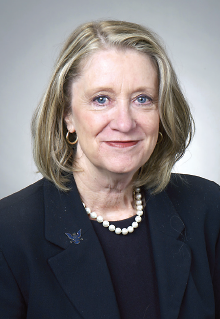This month APA President-Elect Anita Everett, M.D., assumed a new position as the chief medical officer at the Substance Abuse and Mental Health Services Administration (SAMHSA).
Everett is now responsible for organizing and leading the newly created Office of the Chief Medical Officer, which is expected to provide valuable input into strategic initiatives, policy directions, and legislative issues to ensure that medically researched and clinically approved practices are incorporated in the development and implementation of SAMSHA programs and activities. Additionally, the office will play a key role in representing SAMHSA’s clinical perspectives, particularly when collaborating with other Department of Health and Human Services entities and federal agencies.
“Having a psychiatrist as a member of the leadership team at SAMHSA will enable psychiatrists to join other mental health and public health professionals in guiding the federal component of our nation’s behavioral health system,” Everett told Psychiatric News. “I’m really excited about the new position.”
One of Everett's first tasks will be to hire staff for the new office, including one policy analyst, one nurse practitioner, and a second physician. Everett also mentioned that she will begin the process of seeking government funding opportunities to promote effective treatment and prevention of mental illness and substance use disorders.
Everett told Psychiatric News that her desire to contribute firsthand to healthy community, social justice, and public services is what led her to this position and has driven her professional career. “I have worked in virtually every aspect of the profession of psychiatry—including private, public, and academic institutions, as well as inpatient and outpatient services, and services for substance use disorders, geriatric, children, and persons with developmental disabilities.”
Prior to taking on the role as SAMHSA’s chief medical officer, Everett served as the division director of Johns Hopkins Community and General Psychiatry, Bayview Campus, in Baltimore, where her research focused on health behavior of individuals with long-term mental illnesses living in urban and underserved areas.
From 1999 to 2003, Everett served as inspector general to the Office of the Governor in the Department of Mental Health in Virginia, completing more than 80 inspections of institutions licensed to provide mental health services within the state. Everett has also been involved in multiple international projects such as working as a consultant with the Ministries of Health in the implementation of government-operated mental health services in Iraq and Afghanistan.
Everett was elected president-elect of APA in February and will assume the office of president at the conclusion of the APA Annual Meeting in San Diego in May 2017. She has held numerous leadership roles within the organization, which include trustee-at-large on the APA Board of Trustees and chair of the APA Task Force on Healthcare Reform 2015.
“As practicing psychiatrists, we have the opportunity to be a catalyst for positive change in the lives of the patients we serve,” Everett told Psychiatric News. “As active members of APA, we have the opportunities to be part of a catalyst for positive change on a larger scale.”
Everett said that psychiatrists know more today than ever before about causes and treatments of behavioral health conditions and must continue to find ways to increase access to effective treatment and prevention.
“Our nation’s behavioral health system is very complex,” said Everett. “We cannot let that deter us from making a difference. As suggested as a tactic in the approach to complex tasks: ‘A journey of a thousand miles begins with the first step,’” Everett concluded. ■

